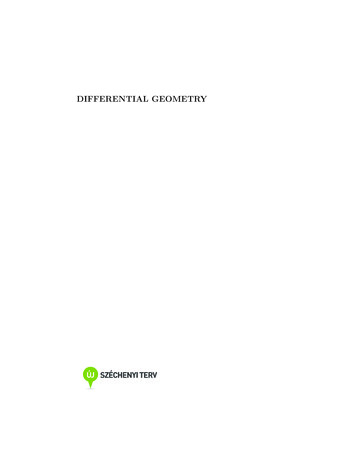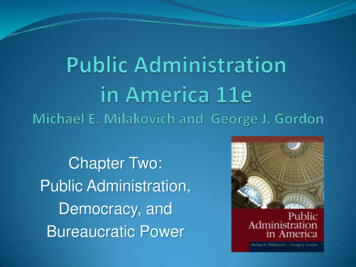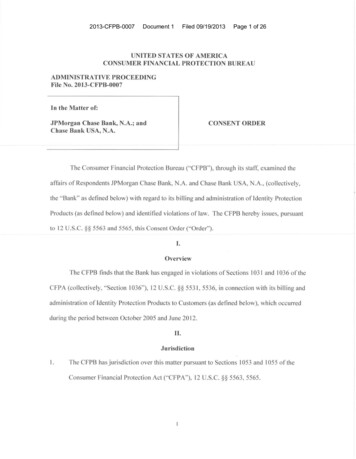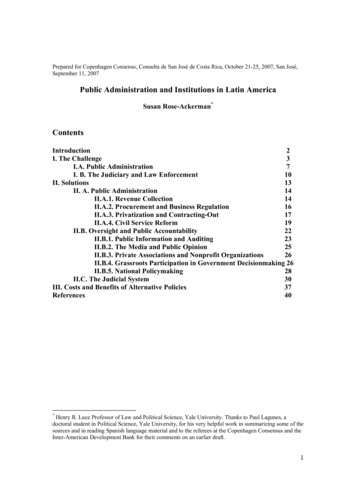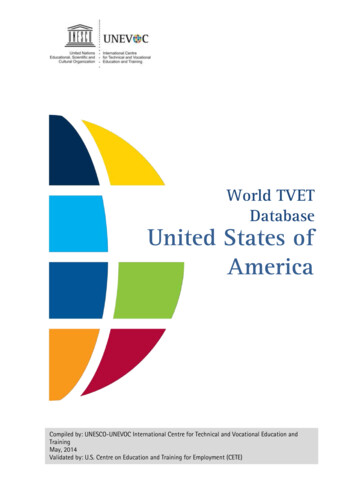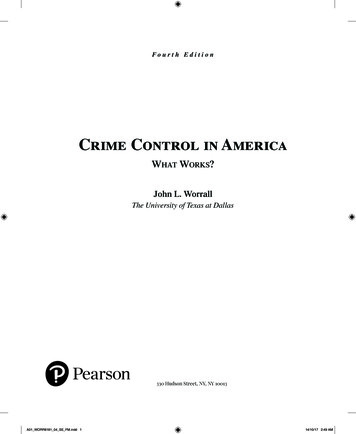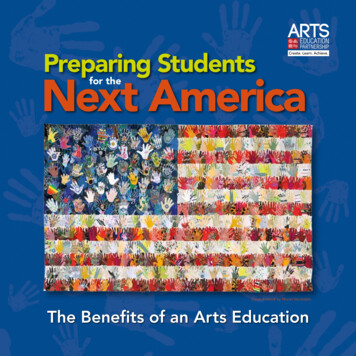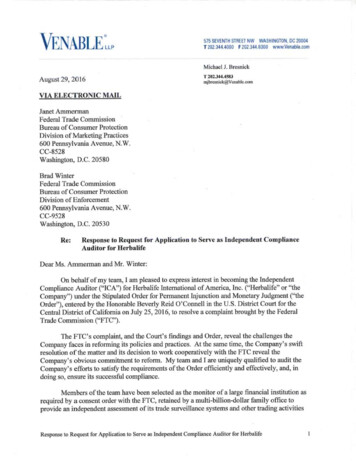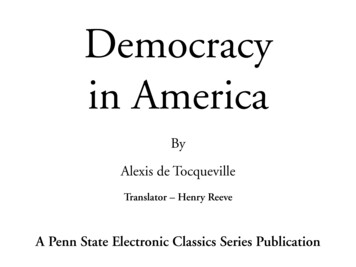
Transcription
Democracyin AmericaByAlexis de TocquevilleTranslator – Henry ReeveA Penn State Electronic Classics Series Publication
Democracy in America, Volumes One and Two by Alexis de Tocqueville, trans. Henry Reeve is apublication of the Pennsylvania State University. This Portable Document file is furnished freeand without any charge of any kind. Any person using this document file, for any purpose, andin any way does so at his or her own risk. Neither the Pennsylvania State University nor JimManis, Faculty Editor, nor anyone associated with the Pennsylvania State University assumesany responsibility for the material contained within the document or for the file as an electronic transmission, in any way.Democracy in America, Volumes One and Two by Alexis de Tocqueville, trans. Henry Reeve, thePennsylvania State University, Electronic Classics Series, Jim Manis, Faculty Editor, Hazleton, PA18201-1291 is a Portable Document File produced as part of an ongoing student publicationproject to bring classical works of literature, in English, to free and easy access of those wishingto make use of them.Cover Design: Jim ManisCopyright 2002 The Pennsylvania State UniversityThe Pennsylvania State University is an equal opportunity university.
TocquevilleBook OneDemocracyIn AmericaIntroductionSpecial IntroductionByHon. John T. MorganVolume 1In the eleven years that separated the Declaration of the Independence of the United States from the completion of thatact in the ordination of our written Constitution, the greatminds of America were bent upon the study of the principles of government that were essential to the preservationof the liberties which had been won at great cost and withheroic labors and sacrifices. Their studies were conducted inview of the imperfections that experience had developed inthe government of the Confederation, and they were, therefore, practical and thorough.When the Constitution was thus perfected and established,a new form of government was created, but it was neitherspeculative nor experimental as to the principles on which itByAlexis de TocquevilleTranslator – Henry Reeve3
Democracy in Americawas based. If they were true principles, as they were, the government founded upon them was destined to a life and aninfluence that would continue while the liberties it was intended to preserve should be valued by the human family.Those liberties had been wrung from reluctant monarchs inmany contests, in many countries, and were grouped intocreeds and established in ordinances sealed with blood, inmany great struggles of the people. They were not new tothe people. They were consecrated theories, but no government had been previously established for the great purposeof their preservation and enforcement. That which was experimental in our plan of government was the questionwhether democratic rule could be so organized and conductedthat it would not degenerate into license and result in thetyranny of absolutism, without saving to the people the powerso often found necessary of repressing or destroying theirenemy, when he was found in the person of a single despot.When, in 1831, Alexis de Tocqueville came to study Democracy in America, the trial of nearly a half-century of theworking of our system had been made, and it had beenproved, by many crucial tests, to be a government of “libertyregulated by law,” with such results in the development ofstrength, in population, wealth, and military and commercial power, as no age had ever witnessed.De Tocqueville had a special inquiry to prosecute, in hisvisit to America, in which his generous and faithful soul andthe powers of his great intellect were engaged in the patrioticeffort to secure to the people of France the blessings thatDemocracy in America had ordained and establishedthroughout nearly the entire Western Hemisphere. He hadread the story of the FrenchRevolution, much of which hadbeen recently written in the blood of men and women ofgreat distinction who were his progenitors; and had witnessedthe agitations and terrors of the Restoration and of the Second Republic, fruitful in crime and sacrifice, and barren ofany good to mankind.He had just witnessed the spread of republican government through all the vast continental possessions of Spain inAmerica, and the loss of her great colonies. He had seen thatthese revolutions were accomplished almost without the shedding of blood, and he was filled with anxiety to learn thecauses that had placed republican government, in France, in4
Tocquevillesuch contrast with Democracy in America.De Tocqueville was scarcely thirty years old when he began his studies of Democracy in America. It was a bold effort for one who had no special training in government, orin the study of political economy, but he had the example ofLafayette in establishing the military foundation of these liberties, and of Washington, Jefferson, Madison, and Hamilton,all of whom were young men, in building upon the Independence of the United States that wisest and best plan ofgeneral government that was ever devised for a free people.He found that the American people, through their chosenrepresentatives who were instructed by their wisdom andexperience and were supported by their virtues – cultivated,purified and ennobled by self-reliance and the love of God –had matured, in the excellent wisdom of their counsels, anew plan of government, which embraced every security fortheir liberties and equal rights and privileges to all in thepursuit of happiness. He came as an honest and impartialstudent and his great commentary, like those of Paul, waswritten for the benefit of all nations and people and in vindication of truths that will stand for their deliverance frommonarchical rule, while time shall last.A French aristocrat of the purest strain of blood and of themost honorable lineage, whose family influence was covetedby crowned heads; who had no quarrel with the rulers of thenation, and was secure against want by his inherited estates;was moved by the agitations that compelled France to attempt to grasp suddenly the liberties and happiness we hadgained in our revolution and, by his devout love of France,to search out and subject to the test of reason the basic principles of free government that had been embodied in ourConstitution. This was the mission of De Tocqueville, andno mission was ever more honorably or justly conducted, orconcluded with greater eclat, or better results for the welfareof mankind.His researches were logical and exhaustive. They includedevery phase of every question that then seemed to be apposite to the great inquiry he was making.The judgment of all who have studied his commentariesseems to have been unanimous, that his talents and learningwere fully equal to his task. He began with the physical geography of this country, and examined the characteristics of5
Democracy in Americathe people, of all races and conditions, their social and religious sentiments, their education and tastes; their industries,their commerce, their local governments, their passions andprejudices, and their ethics and literature; leaving nothingunnoticed that might afford an argument to prove that ourplan and form of government was or was not adapted especially to a peculiar people, or that it would be impracticablein any different country, or among any different people.The pride and comfort that the American people enjoy inthe great commentaries of De Tocqueville are far removedfrom the selfish adulation that comes from a great and singular success. It is the consciousness of victory over a falsetheory of government which has afflicted mankind for manyages, that gives joy to the true American, as it did to DeTocqueville in his great triumph.When De Tocqueville wrote, we had lived less than fiftyyears under our Constitution. In that time no great nationalcommotion had occurred that tested its strength, or its powerof resistance to internal strife, such as had converted his beloved France into fields of slaughter torn by tempests of wrath.He had a strong conviction that no government could beordained that could resist these internal forces, when, theyare directed to its destruction by bad men, or unreasoningmobs, and many then believed, as some yet believe, that ourgovernment is unequal to such pressure, when the assault isthoroughly desperate.Had De Tocqueville lived to examine the history of theUnited States from 1860 to 1870, his misgivings as to thispower of self- preservation would, probably, have been clearedoff. He would have seen that, at the end of the most destructive civil war that ever occurred, when animosities of thebitterest sort had banished all good feeling from the heartsof our people, the States of the American Union, still in complete organization and equipped with all their official entourage, aligned themselves in their places and took up the powers and duties of local government in perfect order and without embarrassment. This would have dispelled his apprehensions, if he had any, about the power of the United Statesto withstand the severest shocks of civil war. Could he havetraced the further course of events until they open the portals of the twentieth century, he would have cast away hisfears of our ability to restore peace, order, and prosperity, in6
Tocquevillethe face of any difficulties, and would have rejoiced to findin the Constitution of the United States the remedy that isprovided for the healing of the nation.De Tocqueville examined, with the care that is worthy theimportance of the subject, the nature and value of the system of “local self-government,” as we style this most important feature of our plan, and (as has often happened) whenthis or any subject has become a matter of anxious concern,his treatment of the questions is found to have been masterly and his preconceptions almost prophetic.We are frequently indebted to him for able expositionsand true doctrines relating to subjects that have slumberedin the minds of the people until they were suddenly forcedon our attention by unexpected events.In his introductory chapter, M. De Tocqueville says:“Amongst the novel objects that attracted my attention during my stay in the United States, nothing struck me moreforcibly than the general equality of conditions.” He referred,doubtless, to social and political conditions among the peopleof the white race, who are described as “We, the people,” inthe opening sentence of the Constitution. The last threeamendments of the Constitution have so changed this, thatthose who were then negro slaves are clothed with the rightsof citizenship, including the right of suffrage. This was apolitical party movement, intended to be radical and revolutionary, but it will, ultimately, react because it has not thesanction of public opinion.If M. De Tocqueville could now search for a law that wouldnegative this provision in its effect upon social equality, hewould fail to find it. But he would find it in the unwrittenlaw of the natural aversion of the races. He would find it inpublic opinion, which is the vital force in every law in a freegovernment. This is a subject that our Constitution failed toregulate, because it was not contemplated by its authors. It isa question that will settle itself, without serious difficulty.The equality in the suffrage, thus guaranteed to the negrorace, alone – for it was not intended to include other coloredraces -creates a new phase of political conditions that M. DeTocqueville could not foresee. Yet, in his commendation ofthe local town and county governments, he applauds andsustains that elementary feature of our political organizationwhich, in the end, will render harmless this wide departure7
Democracy in Americafrom the original plan and purpose of American Democracy. “Local Self-Government,” independent of general control, except for general purposes, is the root and origin of allfree republican government, and is the antagonist of all greatpolitical combinations that threaten the rights of minorities.It is the public opinion formed in the independent expressions of towns and other small civil districts that is the realconservatism of free government. It is equally the enemy ofthat dangerous evil, the corruption of the ballot-box, fromwhich it is now apprehended that one of our greatest troublesis to arise.The voter is selected, under our laws, because he has certainphysical qualifications – age and sex. His disqualifications,when any are imposed, relate to his education or property,and to the fact that he has not been convicted of crime. Of allmen he should be most directly amenable to public opinion.The test of moral character and devotion to the duties ofgood citizenship are ignored in the laws, because the courtscan seldom deal with such questions in a uniform and satisfactory way, under rules that apply alike to all. Thus the voter,selected by law to represent himself and four other non-vot-ing citizens, is often a person who is unfit for any publicduty or trust. In a town government, having a small area ofjurisdiction, where the voice of the majority of qualified voters is conclusive, the fitness of the person who is to exercisethat high representative privilege can be determined by hisneighbors and acquaintances, and, in the great majority ofcases, it will be decided honestly and for the good of thecountry. In such meetings, there is always a spirit of loyaltyto the State, because that is loyalty to the people, and a reverence for God that gives weight to the duties and responsibilities of citizenship.M. De Tocqueville found in these minor local jurisdictionsthe theoretical conservatism which, in the aggregate, is thesafest reliance of the State. So we have found them, in practice, the true protectors of the purity of the ballot, withoutwhich all free government will degenerate into absolutism.In the future of the Republic, we must encounter manydifficult and dangerous situations, but the principles established in the Constitution and the check upon hasty or inconsiderate legislation, and upon executive action, and thesupreme arbitrament of the courts, will be found sufficient8
TocquevilleSpecial IntroductionByHon. John J. Ingallsfor the safety of personal rights, and for the safety of thegovernment, and the prophetic outlook of M. De Tocquevillewill be fully realized through the influence of Democracy inAmerica. Each succeeding generation of Americans will findin the pure and impartial reflections of De Tocqueville a newsource of pride in our institutions of government, and soundreasons for patriotic effort to preserve them and to inculcatetheir teachings. They have mastered the power of monarchical rule in the American Hemisphere, freeing religion fromall shackles, and will spread, by a quiet but resistless influence, through the islands of the seas to other lands, wherethe appeals of De Tocqueville for human rights and libertieshave already inspired the souls of the people.Nearly two-thirds of a century has elapsed since the appearance of “Democracy in America,” by Alexis Charles HenriClerel de Tocqueville, a French nobleman, born at Paris, July29, 1805.Bred to the law, he exhibited an early predilection for philosophy and political economy, and at twenty-two was appointed judge-auditor at the tribunal of Versailles.In 1831, commissioned ostensibly to investigate the penitentiary system of the United States, he visited this country,with his friend, Gustave de Beaumont, travelling extensivelythrough those parts of the Republic then subdued to settlement, studying the methods of local, State, and national administration, and observing the manners and habits, the dailylife, the business, the industries and occupations of the people.“Democracy in America,” the first of four volumes upon“American Institutions and their Influence,” was publishedin 1835. It was received at once by the scholars and thinkersHon. John T. Morgan9
Democracy in Americaof Europe as a profound, impartial, and entertaining exposition of the principles of popular, representative self-government.Napoleon, “The mighty somnambulist of a vanisheddream,” had abolished feudalism and absolutism, mademonarchs and dynasties obsolete, and substituted for thedivine right of kings the sovereignty of the people.Although by birth and sympathies an aristocrat, M. deTocqueville saw that the reign of tradition and privilege atlast was ended. He perceived that civilization, after manybloody centuries, had entered a new epoch. He beheld, anddeplored, the excesses that had attended the genesis of thedemocratic spirit in France, and while he loved liberty, hedetested the crimes that had been committed in its name.Belonging neither to the class which regarded the social revolution as an innovation to be resisted, nor to that which considered political equality the universal panacea for the evilsof humanity, he resolved by personal observation of the results of democracy in the New World to ascertain its naturalconsequences, and to learn what the nations of Europe hadto hope or fear from its final supremacy.That a youth of twenty-six should entertain a design sobroad and bold implies singular intellectual intrepidity. Hehad neither model nor precedent. The vastness and noveltyof the undertaking increase admiration for the remarkableability with which the task was performed.Were literary excellence the sole claim of “Democracy inAmerica” to distinction, the splendor of its composition alonewould entitle it to high place among the masterpieces of thecentury. The first chapter, upon the exterior form of NorthAmerica, as the theatre upon which the great drama is to beenacted, for graphic and picturesque description of the physical characteristics of the continent is not surpassed in literature: nor is there any subdivision of the work in which theseverest philosophy is not invested with the grace of poetry,and the driest statistics with the charm of romance. Westernemigration seemed commonplace and prosaic till M. deTocqueville said, “This gradual and continuous progress ofthe European race toward the Rocky Mountains has the solemnity of a providential event; it is like a deluge of menrising unabatedly, and daily driven onward by the hand ofGod!”10
TocquevilleThe mind of M. de Tocqueville had the candor of the photographic camera. It recorded impressions with the impartiality of nature. The image was sometimes distorted, andthe perspective was not always true, but he was neither apanegyrist, nor an advocate, nor a critic. He observed American phenomena as illustrations, not as proof nor arguments;and although it is apparent that the tendency of his mindwas not wholly favorable to the democratic principle, yetthose who dissent from his conclusions must commend theability and courage with which they are expressed.Though not originally written for Americans, “Democracy in America” must always remain a work of engrossingand constantly increasing interest to citizens of the UnitedStates as the first philosophic and comprehensive view ofour society, institutions, and destiny. No one can rise evenfrom the most cursory perusal without clearer insight andmore patriotic appreciation of the blessings of liberty protected by law, nor without encouragement for the stabilityand perpetuity of the Republic. The causes which appearedto M. de Tocqueville to menace both, have gone. The despotism of public opinion, the tyranny of majorities, the ab-sence of intellectual freedom which seemed to him to degrade administration and bring statesmanship, learning, andliterature to the level of the lowest, are no longer considered.The violence of party spirit has been mitigated, and the judgment of the wise is not subordinated to the prejudices of theignorant.Other dangers have come. Equality of conditions no longerexists. Prophets of evil predict the downfall of democracy,but the student of M. de Tocqueville will find consolationand encouragement in the reflection that the same spiritwhich has vanquished the perils of the past, which he foresaw, will be equally prepared for the responsibilities of thepresent and the future.The last of the four volumes of M. de Tocqueville’s workupon American institutions appeared in 1840.In 1838 he was chosen member of the Academy of Moraland Political Sciences. In 1839 he was elected to the Chamber of Deputies. He became a member of the French Academy in 1841. In 1848 he was in the Assembly, and fromJune 2nd to October 31st he was Minister of Foreign Affairs. The coup d’etat of December 2, 1851 drove him from11
Democracy in AmericaIntroductory Chapterthe public service. In 1856 he published “The Old Regimeand the Revolution.” He died at Cannes, April 15, 1859, atthe age of fifty-four.Amongst the novel objects that attracted my attention during my stay in the United States, nothing struck me moreforcibly than the general equality of conditions. I readily discovered the prodigious influence which this primary factexercises on the whole course of society, by giving a certaindirection to public opinion, and a certain tenor to the laws;by imparting new maxims to the governing powers, and peculiar habits to the governed. I speedily perceived that theinfluence of this fact extends far beyond the political character and the laws of the country, and that it has no less empireover civil society than over the Government; it creates opinions, engenders sentiments, suggests the ordinary practicesof life, and modifies whatever it does not produce. The moreI advanced in the study of American society, the more I perceived that the equality of conditions is the fundamental factfrom which all others seem to be derived, and the centralpoint at which all my observations constantly terminated.I then turned my thoughts to our own hemisphere, whereI imagined that I discerned something analogous to the spec-Hon. John J. Ingalls12
Tocquevilletacle which the New World presented to me. I observed thatthe equality of conditions is daily progressing towards thoseextreme limits which it seems to have reached in the UnitedStates, and that the democracy which governs the Americancommunities appears to be rapidly rising into power in Europe. I hence conceived the idea of the book which is nowbefore the reader.It is evident to all alike that a great democratic revolutionis going on amongst us; but there are two opinions as to itsnature and consequences. To some it appears to be a novelaccident, which as such may still be checked; to others itseems irresistible, because it is the most uniform, the mostancient, and the most permanent tendency which is to befound in history. Let us recollect the situation of France sevenhundred years ago, when the territory was divided amongsta small number of families, who were the owners of the soiland the rulers of the inhabitants; the right of governing descended with the family inheritance from generation to generation; force was the only means by which man could acton man, and landed property was the sole source of power.Soon, however, the political power of the clergy was founded,and began to exert itself: the clergy opened its ranks to allclasses, to the poor and the rich, the villein and the lord;equality penetrated into the Government through theChurch, and the being who as a serf must have vegetated inperpetual bondage took his place as a priest in the midst ofnobles, and not infrequently above the heads of kings.The different relations of men became more complicatedand more numerous as society gradually became more stableand more civilized. Thence the want of civil laws was felt;and the order of legal functionaries soon rose from the obscurity of the tribunals and their dusty chambers, to appearat the court of the monarch, by the side of the feudal baronsin their ermine and their mail. Whilst the kings were ruining themselves by their great enterprises, and the nobles exhausting their resources by private wars, the lower orderswere enriching themselves by commerce. The influence ofmoney began to be perceptible in State affairs. The transactions of business opened a new road to power, and the financier rose to a station of political influence in which he was atonce flattered and despised. Gradually the spread of mentalacquirements, and the increasing taste for literature and art,13
Democracy in Americaopened chances of success to talent; science became a meansof government, intelligence led to social power, and the manof letters took a part in the affairs of the State. The valueattached to the privileges of birth decreased in the exact proportion in which new paths were struck out to advancement.In the eleventh century nobility was beyond all price; in thethirteenth it might be purchased; it was conferred for thefirst time in 1270; and equality was thus introduced into theGovernment by the aristocracy itself.In the course of these seven hundred years it sometimeshappened that in order to resist the authority of the Crown,or to diminish the power of their rivals, the nobles granted acertain share of political rights to the people. Or, more frequently, the king permitted the lower orders to enjoy a degree of power, with the intention of repressing the aristocracy. In France the kings have always been the most activeand the most constant of levellers. When they were strongand ambitious they spared no pains to raise the people to thelevel of the nobles; when they were temperate or weak theyallowed the people to rise above themselves. Some assistedthe democracy by their talents, others by their vices. LouisXI and Louis XIV reduced every rank beneath the throne tothe same subjection; Louis XV descended, himself and allhis Court, into the dust.As soon as land was held on any other than a feudal tenure, and personal property began in its turn to confer influence and power, every improvement which was introducedin commerce or manufacture was a fresh element of the equality of conditions. Henceforward every new discovery, everynew want which it engendered, and every new desire whichcraved satisfaction, was a step towards the universal level.The taste for luxury, the love of war, the sway of fashion, andthe most superficial as well as the deepest passions of thehuman heart, co-operated to enrich the poor and to impoverish the rich.From the time when the exercise of the intellect becamethe source of strength and of wealth, it is impossible not toconsider every addition to science, every fresh truth, and everynew idea as a germ of power placed within the reach of thepeople. Poetry, eloquence, and memory, the grace of wit, theglow of imagination, the depth of thought, and all the giftswhich are bestowed by Providence with an equal hand, turned14
Tocquevilleto the advantage of the democracy; and even when they werein the possession of its adversaries they still served its causeby throwing into relief the natural greatness of man; its conquests spread, therefore, with those of civilization and knowledge, and literature became an arsenal where the poorest andthe weakest could always find weapons to their hand.In perusing the pages of our history, we shall scarcely meetwith a single great event, in the lapse of seven hundred years,which has not turned to the advantage of equality. The Crusades and the wars of the English decimated the nobles anddivided their possessions; the erection of communities introduced an element of democratic liberty into the bosom offeudal monarchy; the invention of fire-arms equalized thevillein and the noble on the field of battle; printing openedthe same resources to the minds of all classes; the post wasorganized so as to bring the same information to the door ofthe poor man’s cottage and to the gate of the palace; andProtestantism proclaimed that all men are alike able to findthe road to heaven. The discovery of America offered a thousand new paths to fortune, and placed riches and powerwithin the reach of the adventurous and the obscure. If weexamine what has happened in France at intervals of fiftyyears, beginning with the eleventh century, we shall invariably perceive that a twofold revolution has taken place in thestate of society. The noble has gone down on the social ladder, and the roturier has gone up; the one descends as theother rises. Every half century brings them nearer to eachother, and they will very shortly meet.Nor is this phenomenon at all peculiar to France.Whithersoever we turn our eyes we shall witness the samecontinual revolution throughout the whole of Christendom.The various occurrences of national existence have everywhere turned to the advantage of democracy; all men haveaided it by their exertions: those who have intentionally labored in its cause, and those who have served it unwittingly;those who have fought for it and those who have declaredthemselves its opponents, have all been driven along in thesame track, have all labored to one end, some ignorantly andsome unwillingly; all have been blind instruments in thehands of God.The gradual development of the equality of conditions istherefore a providential fact, and it possesses all the charac15
Democracy in Americateristics of a divine decree: it is universal, it is durable, itconstantly eludes all human interference, and all events aswell as all men contribute to its progress. Would it, then, bewise to imagine that a social impulse which dates from so farback can be checked by the efforts of a generation? Is it credible that the democracy which has annihilated the feudalsystem and vanquished kings will respect the citizen and thecapitalist? Will it stop now that it has grown so strong andits adversaries so weak? None can say which way we are going, for all terms of comparison are wanting: the equality ofconditions is more complete in the Christian countries ofthe present day than it has been at any time or in any part ofthe world; so that the extent of what already exists preventsus from
Book One Introduction Special Introduction By Hon. John T. Morgan In the eleven years that separated the Declaration of the In-dependence of the United States from the completion of that act in the ordination of our written Constitution, the gre
